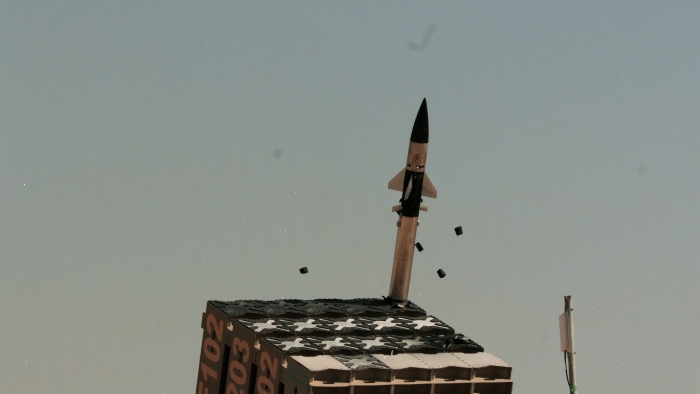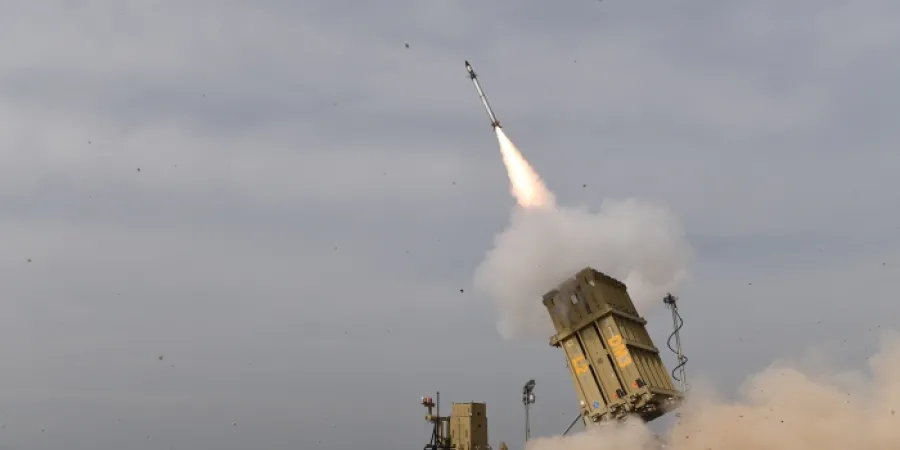Top defense officials, Rafael mark 10 years since Iron Dome's first interception
At a ceremony in honor of the occasion, Defense Minister Gantz said "We are preparing to face the different challenges on the various fronts, including the direct and indirect threats from Iran"
IsraelDefense
| 07/04/2021
On Wednesday morning, Israeli Defense Minister Benny Gantz joined Minister Amir Peretz and senior defense executives for a defense briefing and ceremony marking a decade since the Iron Dome defense system was first activated. The meeting began with a status briefing, during which the defense minister reviewed new developments and the current state of the defense system's geographic deployment, after which he held a discussion with combat soldiers and attended a ceremony marking a decade since the system's first interception.
In an address, Gantz said "We are preparing ourselves at this time on numerous fronts: at our southern and northern borders, as well as vis-à-vis the threats that Iran is presenting, whether directly or indirectly via its proxies in the Middle East. The State of Israel is the strongest country in the region and it will remain that way for two reasons: because we have no choice, and because of people like you, those who came before you and those who will come after you, who fulfill their role so gracefully and so well. We have offensive systems that are active 24/7, 365 days a year, and are ready for action on any front, at any range, and in any dimension in which the IDF is called upon to act."
In a statement, Rafael Advanced Defense Systems, manufacturer of the system, said Iron Dome has saved numerous lives with over 2,500 interceptions and a success rate of 90%. The system's development began in December 2007 and was completed in less than 3 years.
Less than a month after being deployed in Israel, on the evening of April 7, 2011, the system made combat history by intercepting a rocket fired from the Gaza Strip toward the southern Israeli city of Ashkelon, preventing civilian injuries and significant damage to property.
Iron Dome's first large-scale and dramatic performance took place during operation Pillar of Defense in 2012, when it intercepted over 500 different threats fired from the Gaza Strip into different parts of Israel, including heavy rocket barrages. Iron Dome had become a game-changer, earning it the Israel Security Award in 2012.
Iron Dome has played an instrumental role in every conflict since then by stopping thousands of rockets from hitting Israel, spanning small to large mortars and rockets with varying ranges and warheads.
Iron Dome serves as a highly mobile, dual mission system, designed to defeat Very Short Range (VSHORAD), as well as rocket, artillery and mortar (C-RAM) threats, aircraft, helicopters, UAVs, PGMs, and cruise missiles. It provides robust, yet selective defense. Its ability to discriminate between threats headed towards a populated area and those that will fall into the sea or open fields, reduces costs, and limits unnecessary interceptor launches. A single battery can protect a medium-sized city, according to Rafael.
Iron Dome's development has continued throughout the years, and its capabilities today include wider coverage, providing protection against a broader spectrum of threats, the ability to handle simultaneous threats, very high-volume salvos, and much more, the company says.
In August 2019, Israel's Ministry of Defense and the US Defense Department signed an agreement for the purchase of two Iron Dome batteries for the US Army. Both batteries have now been delivered to the US.
Rafael has developed additional variants of the Iron Dome system, to form a family that consists of the naval variant C-Dome, providing protection of strategic naval and land assets against advanced ballistic, aerial and surface-to surface threats, including saturated attacks. C-Dome is operational with the Israeli Navy. Iron Dome is also offered as an integrated, all-in-one air defense (I-Dome) system for maneuvering tactical forces in the field on a single vehicle, according to the company.
Rafael's President and CEO, Maj. Gen. (Ret.) Yoav Har-Even, said "Iron Dome is a household name in Israel, and has become synonymous with excellence. We are proud of our teams of scientists and engineers who developed this extraordinary system and are continuing to do so on a daily basis. Thanks to them, Iron Dome's capabilities are light years beyond its original design. We have seen it turn from a blueprint into a true game-changer, saving lives, preventing escalation, enabling military and political decision-makers to make calm and collected decisions. It has allowed Israel to carry on its daily routine, even while being targeted by an indiscriminate enemy. We are thankful to our teams, to the Israeli Ministry of Defense and to the IDF, to our partner industries ELTA, our subsidiary mPrest and others. We are especially thankful to current and past American administrations for their support in the manufacturing of the system."
A video released by Rafael marking the anniversary can be seen here.

Photo: Rafael
At a ceremony in honor of the occasion, Defense Minister Gantz said "We are preparing to face the different challenges on the various fronts, including the direct and indirect threats from Iran"
On Wednesday morning, Israeli Defense Minister Benny Gantz joined Minister Amir Peretz and senior defense executives for a defense briefing and ceremony marking a decade since the Iron Dome defense system was first activated. The meeting began with a status briefing, during which the defense minister reviewed new developments and the current state of the defense system's geographic deployment, after which he held a discussion with combat soldiers and attended a ceremony marking a decade since the system's first interception.
In an address, Gantz said "We are preparing ourselves at this time on numerous fronts: at our southern and northern borders, as well as vis-à-vis the threats that Iran is presenting, whether directly or indirectly via its proxies in the Middle East. The State of Israel is the strongest country in the region and it will remain that way for two reasons: because we have no choice, and because of people like you, those who came before you and those who will come after you, who fulfill their role so gracefully and so well. We have offensive systems that are active 24/7, 365 days a year, and are ready for action on any front, at any range, and in any dimension in which the IDF is called upon to act."
In a statement, Rafael Advanced Defense Systems, manufacturer of the system, said Iron Dome has saved numerous lives with over 2,500 interceptions and a success rate of 90%. The system's development began in December 2007 and was completed in less than 3 years.
Less than a month after being deployed in Israel, on the evening of April 7, 2011, the system made combat history by intercepting a rocket fired from the Gaza Strip toward the southern Israeli city of Ashkelon, preventing civilian injuries and significant damage to property.
Iron Dome's first large-scale and dramatic performance took place during operation Pillar of Defense in 2012, when it intercepted over 500 different threats fired from the Gaza Strip into different parts of Israel, including heavy rocket barrages. Iron Dome had become a game-changer, earning it the Israel Security Award in 2012.
Iron Dome has played an instrumental role in every conflict since then by stopping thousands of rockets from hitting Israel, spanning small to large mortars and rockets with varying ranges and warheads.
Iron Dome serves as a highly mobile, dual mission system, designed to defeat Very Short Range (VSHORAD), as well as rocket, artillery and mortar (C-RAM) threats, aircraft, helicopters, UAVs, PGMs, and cruise missiles. It provides robust, yet selective defense. Its ability to discriminate between threats headed towards a populated area and those that will fall into the sea or open fields, reduces costs, and limits unnecessary interceptor launches. A single battery can protect a medium-sized city, according to Rafael.
Iron Dome's development has continued throughout the years, and its capabilities today include wider coverage, providing protection against a broader spectrum of threats, the ability to handle simultaneous threats, very high-volume salvos, and much more, the company says.
In August 2019, Israel's Ministry of Defense and the US Defense Department signed an agreement for the purchase of two Iron Dome batteries for the US Army. Both batteries have now been delivered to the US.
Rafael has developed additional variants of the Iron Dome system, to form a family that consists of the naval variant C-Dome, providing protection of strategic naval and land assets against advanced ballistic, aerial and surface-to surface threats, including saturated attacks. C-Dome is operational with the Israeli Navy. Iron Dome is also offered as an integrated, all-in-one air defense (I-Dome) system for maneuvering tactical forces in the field on a single vehicle, according to the company.
Rafael's President and CEO, Maj. Gen. (Ret.) Yoav Har-Even, said "Iron Dome is a household name in Israel, and has become synonymous with excellence. We are proud of our teams of scientists and engineers who developed this extraordinary system and are continuing to do so on a daily basis. Thanks to them, Iron Dome's capabilities are light years beyond its original design. We have seen it turn from a blueprint into a true game-changer, saving lives, preventing escalation, enabling military and political decision-makers to make calm and collected decisions. It has allowed Israel to carry on its daily routine, even while being targeted by an indiscriminate enemy. We are thankful to our teams, to the Israeli Ministry of Defense and to the IDF, to our partner industries ELTA, our subsidiary mPrest and others. We are especially thankful to current and past American administrations for their support in the manufacturing of the system."
A video released by Rafael marking the anniversary can be seen here.

Photo: Rafael



